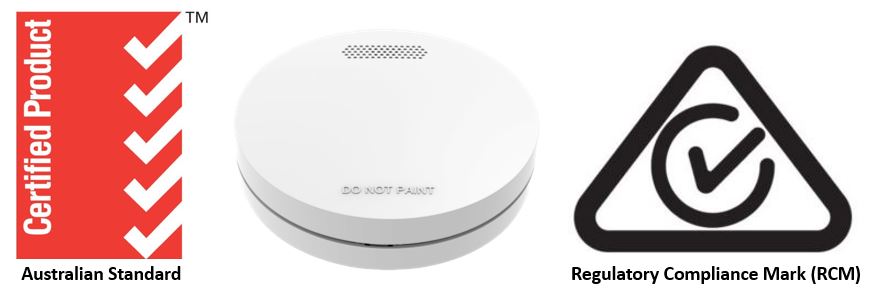Smoke Detector Alarm Battery Safety Amid Rising Lithium-Ion Fires in Queensland
Australia has experienced a surge in the adoption of lithium-ion battery technology, and Queensland is no exception. These small, lightweight, and versatile batteries have revolutionized modern life, powering everything from a smoke detector alarm battery, smartphones, and laptops to e-scooters, e-bikes, and home renewable energy storage systems.
However, this remarkable technological advancement comes with a concerning downside—a significant increase in lithium-ion battery fires in homes across Queensland. As more households rely on rechargeable lithium-ion batteries, the risk of overheating, short-circuiting, and thermal runaway leading to devastating house fires has also risen. These incidents have prompted urgent discussions on battery safety regulations, storage precautions, and the need for high-quality fire detection systems, such as photoelectric interconnected smoke alarms.
Understanding the differences between battery types, particularly with a smoke detector alarm battery, is essential to ensuring home safety and preventing potential fire hazards.
QLD Lithium-Ion Battery Fires Increasing Significantly
Data compiled from each Australian state fire department reveals that since 2021, more than 450 fires related to lithium-ion batteries have occurred in Australia, with 157 of them in Queensland alone. Improper battery charging practices have been identified as one of the primary causes behind these alarming incidents. When consumers use incompatible battery chargers or leave their electronic devices, like e-scooters, charging unattended for extended periods, overcharging and overheating of the lithium-ion battery can occur.
What Causes Lithium-Ion Battery Fires?
Another significant cause of lithium-ion battery fires is manufacturing defects in either the battery charger or the battery itself. Poor quality control during production can lead to internal faults, increasing the risk of overheating and fire. Additionally, improper storage or transportation of lithium-ion batteries can cause short circuits and subsequent fires. To minimize this risk, it is crucial to avoid purchasing cheap lithium-ion batteries and chargers from unregulated online marketplaces and to opt for original equipment manufacturer (OEM) products.
The nature of use for e-scooters and e-bikes exposes their batteries to rough handling and environmental elements, making them susceptible to damage that can result in internal short-circuits and fires. Even minor physical damage to the battery’s protective casing can create a pathway for ‘thermal runaway’, triggering a catastrophic fire event. When lithium-ion batteries fail, they undergo thermal runaway, leading to the violent bursting of battery cells, the release of toxic, flammable, and explosive gases, and an intense, self-sustaining fire. These fires are challenging to extinguish with water or regular fire extinguishers, and they can easily reignite after being put out.
Are The Lithium Batteries Dangerous
Inside My Smoke Alarm?
This is a great question and one that should be asked when considering smoke detector alarm battery safety. It would be deeply ironic if smoke alarms designed to detect smoke and save lives were actually powered by problematic lithium-ion batteries—a known cause of house fires!
Fortunately, the fire risk associated with lithium-ion batteries is not present in the 10-year lithium batteries sealed inside your interconnected smoke alarms. Here’s why:
Your smoke detector alarm battery actually consists of two small, 3V lithium batteries which are non-replaceable and non-rechargeable. They are specifically designed to deplete slowly and steadily over a 10-year lifespan. Unlike the much larger lithium-ion batteries found in e-bikes and e-scooters, they do not undergo repeated charging and discharging cycles, which is a primary cause of thermal runaway and battery fires.
Additionally, a smoke detector alarm battery is typically not exposed to physical stress, such as bumping, knocking, or overheating, which can damage rechargeable lithium-ion batteries in other devices. This significantly reduces fire risk and ensures long-term reliability of a smoke alarm detector battery.
All interconnected smoke alarms sold in Australia must comply with Australian Standard 3786:2014, which mandates stringent electrical testing before they are approved for sale. This means the smoke detector alarm battery inside your alarm has been thoroughly tested to meet strict safety regulations.
For maximum safety and peace of mind, consider ZEN Smoke Alarms, which feature a sealed 10-year lithium smoke detector alarm battery, ensuring worry-free, maintenance-free protection with no risk of overheating or fire hazards. Stay safe, stay protected, and choose ZEN!
Lithium Smoke Detector Alarm Battery Safety
It is essential that all interconnected smoke alarms purchased are certified to Australian Standard 3786:2014 and bear the official Australian Standard mark and the Regulatory Compliance Mark (RCM). The RCM signifies compliance with Australian electrical safety and electromagnetic compatibility regulations, as outlined in Australian Standard 3820:2020. By avoiding cheap knock-offs lacking these marks, consumers can ensure they are purchasing legitimate, safe electrical appliances.

ZEN Smoke Alarms and your symbols of smoke detector alarm battery safety compliance
Top Tips For Preventing Lithium-Ion Battery Fires
- Use Manufacturer-Approved Chargers:
- Always use the charger and power adapter that comes with your device or is recommended by the manufacturer.
- Monitor Charging:
- Charge batteries in a place where you can keep an eye on them and avoid charging overnight or when you’re not at home.
- Avoid Overcharging:
- Unplug devices once they are fully charged to prevent overheating and reduce wear on the battery.
- Store Batteries Safely:
- Keep batteries in a cool, dry place, away from direct sunlight and flammable materials.
- Avoid Physical Damage:
- Handle batteries with care to prevent drops, punctures, or any form of physical damage that could lead to internal short circuits.
- Check for Damage:
- Regularly inspect batteries for signs of damage, swelling, or leakage. Stop using and properly dispose of any damaged batteries. This is particularly important for any transportation or mobility devices such as e-bikes or e-scooters.
- Keep Away from Extreme Temperatures:
- Avoid exposing batteries to high or low temperatures, which can cause damage and increase the risk of fire.
- Don’t Mix Batteries:
- Do not use old and new batteries, or batteries of different types and capacities, together in the same device.
- Proper Disposal:
- Do not throw lithium-ion batteries in the regular wheelie bin to prevent potential fires. Ensure that you tape the terminals of used batteries with clear sticky tape before taking them to your local Council’s drop off point / recovery centre.
- Install Interconnected Smoke Alarms:
- Install ZEN interconnected smoke alarms in areas where lithium-ion batteries are charged and stored to ensure early detection of any fire.
Smoke Detector Alarm Battery – Safety Summary
The increase in lithium-ion battery fires necessitates a collaborative effort from manufacturers, regulators, and users to address this growing concern. While the advantages of lithium-ion batteries are undeniable, safety risks demand immediate attention.
By enhancing safety regulations, improving manufacturing standards, and promoting responsible usage and recharging practices, Australia can fully embrace the lithium-ion battery revolution while ensuring a safer and more sustainable future for all. One of the most important safety measures in any home is a reliable smoke detector alarm battery to provide early fire detection. Don’t take chances with fire safety—protect your home with high-quality and safe ZEN Smoke Alarms today.

Want to know more? Watch our ZEN Smoke Alarm YouTube channel or call us on 0478 596 402 today
We love talking smoke alarms!
ZEN Interconnected Smoke Alarms
New Farm, QLD, 4005

